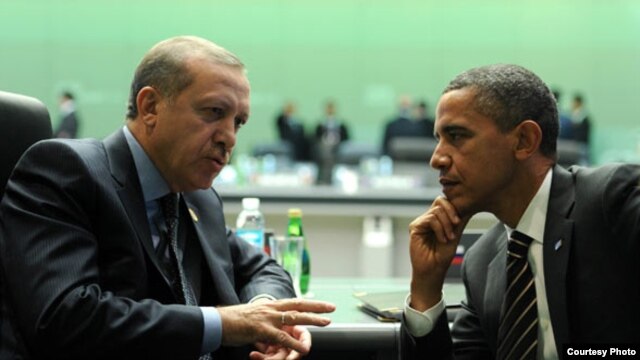Turkey to allow U.S. air strikes against IS from Incirlik air base
| Publisher | Radio Free Europe/Radio Liberty |
| Publication Date | 23 July 2015 |
| Cite as | Radio Free Europe/Radio Liberty, Turkey to allow U.S. air strikes against IS from Incirlik air base, 23 July 2015, available at: https://www.refworld.org/docid/55ee95f76.html [accessed 2 June 2023] |
| Disclaimer | This is not a UNHCR publication. UNHCR is not responsible for, nor does it necessarily endorse, its content. Any views expressed are solely those of the author or publisher and do not necessarily reflect those of UNHCR, the United Nations or its Member States. |
July 23, 2015
 U.S. President Barack Obama (right) and his Turkish counterpart Recep Tayip Erdogan (left) spoke by phone on July 23.
U.S. President Barack Obama (right) and his Turkish counterpart Recep Tayip Erdogan (left) spoke by phone on July 23.
Turkey's President Recep Tayyip Erdogan reportedly has agreed to allow U.S. military air strikes to be launched against Islamic State (IS) militants in Syria and Iraq from the Incirlik Air Base in southeastern Turkey.
U.S. defense officials cited by The Wall Street Journal say the agreement came on July 23 in a phone call between Erdogan and President Barack Obama after a cross-border attack by IS militants in Syria that killed a Turkish soldier on Turkey's side of the border earlier in the day.
They said manned U.S. warplanes as well as pilotless drones would be allowed to launch from Incirlik for attacks against IS militants.
The White House announced after the cross-border skirmish that Obama and Erdogan spoke by telephone about efforts to deepen coordination in the fight against Islamic State militants in Syria and Iraq.
But the White House has not yet commented on the reports of a new agreement being reached on the use of Incirlik for air strikes.
In Ankara, Turkish Prime Minister Ahmet Davutoglu said his government will take "all necessary measures" to protect public order and national security following attacks by both IS extremists and Kurdish militants.
The security situation in Turkey has deteriorated rapidly since a suicide bomber with suspected ties to IS militants in Syria and Iraq killed 32 young Kurds on July 20 in the border city of Suruc – which lies just across the frontier from the Syrian city of Kobani, the site of heavy fighting in the past year between IS militants and Syrian Kurds.
There have been angry protests by Kurds across Turkey in the aftermath of that bombing, with demonstrators claiming that Turkish security forces have not been doing enough to protect Turkish Kurds in the southeast from the threat posed by IS militants in Syria.
The outlawed Kurdistan Workers Party has claimed responsibility for killing two police on July 22, accusing them of helping the IS suicide attack on July 20 in Suruc against a group of young Kurds who were preparing to help rebuild war-damaged Kobani.
On July 23, another Turkish police officer was shot dead and another wounded while conducting a traffic check in the mostly Kurdish city of Diyarbakir.
The United States has been negotiating with Turkish officials for months for permission to launch air strikes against IS militants in both Syria and Iraq from the Incirlik military base.
Turkey had been resisting the idea amid domestic opposition, but in recent days, the country has been hit by a surge of violence blamed on IS-linked militants that has also fueled unrest among Turkey's Kurdish minority.
Erdogan's telephone conference with Obama on July 23 came as Turkey's military scrambled fighter jets on the country's southeastern border, and Turkish ground forces fired at IS militants in Syria using tanks and heavy artillery following the cross-border attack by IS earlier in the day.
Authorities say the Turkish outpost was fired upon by gunmen who were positioned within Syrian territory that is controlled by IS militants.
They say Turkish troops returned fire and killed at least one suspected IS militant.
With reporting by Wall Street Journal, AP, Reuters, and AFP
Link to original story on RFE/RL website
